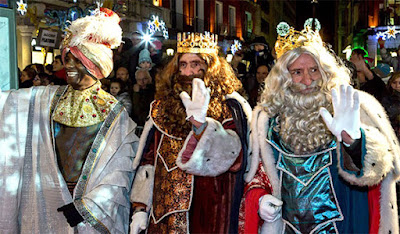Welcome dear friends back to the Hypnogoria Old-time Yuletide Advent Calendar! We have reached Door 5, and today we will learn all about E for Epiphany!
Now Epiphany is the name of the feast day in the church that commemorates the visit of the Magi - commonly dubbed the Wise Men or Three Kings - to the newly born infant Jesus. And it falls upon the 6th of January, a date we also mark as Twelfth Night. And there is much lore associated with this Biblical visit.
To begin with the scripture is not clear who these gentlemen were or where exactly they came from. And we are not even sure how many of them there actually were either! Over the centuries, many generations have all just assumed there were three Wise Men, because they came with three gifts - gold, frankincense and myrrh.
Now The Bible also never refers to them as kings either, however thanks to a prophecy in the book of Isaiah and the Psalms which states the Saviour would be worshipped by kings, in early mediaeval times it became widely accepted that the Wise Men must be kings!
But do we know who they were? The Gospel of Matthew tells us that they were “wise men from the east”, with the original Greek using the word “magos” which comes from the same root word as “magic” and indeed translates as “magician” or “sorcerer”. Interestingly “magos” was also used in Classical antiquity to specifically refer the priests of the Persian religion Zoroastrianism, and even more fascinating is the fact that history has shown that an important part of the duties of the priests of Zoroaster was the study of the heavens and the movement of the stars. All of which fits intriguingly well with the Wise Men who we all know famously followed a star!
In mediaeval times many legends grew up about the mysterious wise men, and the three gained names and some backstory too. First there was Caspar, then Melichor, who came from Persia, and finally Balthazar, who came from Babylon. It has also been claimed that it was the Wise Men who inspired the tradition of giving gifts at Christmas. Certainly there is evidence from history that over the centuries people did exchange presents at Epiphany rather than Christmas Day, and in Spain and other Hispanic countries, this tradition persists. In fact, in this tradition it is said that it is the Wise Men themselves, known as Los Tres Reyes Magos, who come and magically deliver the presents to all the children! It is said that Melchior delivers to Europe, Caspar to Asia, and Balthazar covers Africa! They travel by camels, and children often leave out food for the camels and a drink of the Wise Men too.
Now we know Epiphany also as Twelfth Night, which has a set of traditions all of its own, and indeed as we will discover behind another door. However here in the British Isles, the feast of Epiphany gained another name - Old Christmas. And therein lies a tale!
I am sure you know, that at a certain point in history we had to reform the calendar as the old Julian system, introduced by the Romans and named after Julius Caesar himself, had gotten badly out of sync with the seasons. So then, a new calendar was set in place by Pope Gregory XIII which corrected the errors, and bar having to add a day every leap year, still works pretty well. Now this new calendar was introduced in October 1582. However crucially it wasn’t adopted by everyone at the same time, leading to a certain amount of confusion.
And perhaps somewhat typically us Brits baulked that this new European innovation, and the Gregorian system wasn’t actually implemented in the UK until nearly two centuries later in 1752. However, to get in sync with the rest of Europe, the date in Britain had to leap ahead, meaning that suddenly eleven days had disappeared into the ether. Britain of course reacted sensibly to this, with riots at first, and protesters demanded back the missing days.
However even after the dust had settled and the new Gregorian calendar was widely accepted, there was still a certain amount of distrust, and many chose to celebrate on what would have been the old dates. So then, St Martin’s Day became Old Halloween, thus strengthening the idea that Halloween is in fact the start of the Christmas season. And folk likewise moved their Yuletide celebrations by eleven days to adhere to when Christmas would have been in the old calendar, and hence Old Christmas was born, which somewhat conveniently fell on the feast of Epiphany. And possibly, this is why Twelfth Night used to be a far bigger celebration. But that is another tale waiting behind another door!
Find all the podcasts in the HYPNOGORIA family here plus more articles on the weird and wonderful here-





No comments:
Post a Comment